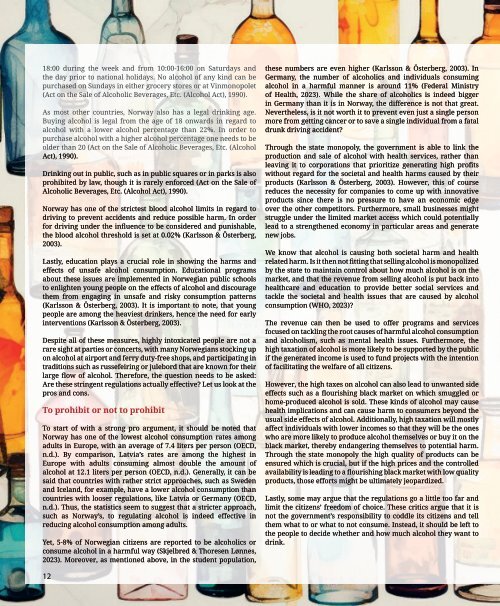DESEMBER_UNIKUM_WEB
Create successful ePaper yourself
Turn your PDF publications into a flip-book with our unique Google optimized e-Paper software.
18:00 during the week and from 10:00-16:00 on Saturdays and<br />
the day prior to national holidays. No alcohol of any kind can be<br />
purchased on Sundays in either grocery stores or at Vinmonopolet<br />
(Act on the Sale of Alcoholic Beverages, Etc. (Alcohol Act), 1990).<br />
As most other countries, Norway also has a legal drinking age.<br />
Buying alcohol is legal from the age of 18 onwards in regard to<br />
alcohol with a lower alcohol percentage than 22%. In order to<br />
purchase alcohol with a higher alcohol percentage one needs to be<br />
older than 20 (Act on the Sale of Alcoholic Beverages, Etc. (Alcohol<br />
Act), 1990).<br />
Drinking out in public, such as in public squares or in parks is also<br />
prohibited by law, though it is rarely enforced (Act on the Sale of<br />
Alcoholic Beverages, Etc. (Alcohol Act), 1990).<br />
Norway has one of the strictest blood alcohol limits in regard to<br />
driving to prevent accidents and reduce possible harm. In order<br />
for driving under the influence to be considered and punishable,<br />
the blood alcohol threshold is set at 0.02% (Karlsson & Österberg,<br />
2003).<br />
Lastly, education plays a crucial role in showing the harms and<br />
effects of unsafe alcohol consumption. Educational programs<br />
about these issues are implemented in Norwegian public schools<br />
to enlighten young people on the effects of alcohol and discourage<br />
them from engaging in unsafe and risky consumption patterns<br />
(Karlsson & Österberg, 2003). It is important to note, that young<br />
people are among the heaviest drinkers, hence the need for early<br />
interventions (Karlsson & Österberg, 2003).<br />
Despite all of these measures, highly intoxicated people are not a<br />
rare sight at parties or concerts, with many Norwegians stocking up<br />
on alcohol at airport and ferry duty-free shops, and participating in<br />
traditions such as russefeiring or julebord that are known for their<br />
large flow of alcohol. Therefore, the question needs to be asked:<br />
Are these stringent regulations actually effective? Let us look at the<br />
pros and cons.<br />
To prohibit or not to prohibit<br />
To start of with a strong pro argument, it should be noted that<br />
Norway has one of the lowest alcohol consumption rates among<br />
adults in Europe, with an average of 7.4 liters per person (OECD,<br />
n.d.). By comparison, Latvia’s rates are among the highest in<br />
Europe with adults consuming almost double the amount of<br />
alcohol at 12.1 liters per person (OECD, n.d.). Generally, it can be<br />
said that countries with rather strict approaches, such as Sweden<br />
and Iceland, for example, have a lower alcohol consumption than<br />
countries with looser regulations, like Latvia or Germany (OECD,<br />
n.d.). Thus, the statistics seem to suggest that a stricter approach,<br />
such as Norway’s, to regulating alcohol is indeed effective in<br />
reducing alcohol consumption among adults.<br />
Yet, 5-8% of Norwegian citizens are reported to be alcoholics or<br />
consume alcohol in a harmful way (Skjelbred & Thoresen Lønnes,<br />
2023). Moreover, as mentioned above, in the student population,<br />
these numbers are even higher (Karlsson & Österberg, 2003). In<br />
Germany, the number of alcoholics and individuals consuming<br />
alcohol in a harmful manner is around 11% (Federal Ministry<br />
of Health, 2023). While the share of alcoholics is indeed bigger<br />
in Germany than it is in Norway, the difference is not that great.<br />
Nevertheless, is it not worth it to prevent even just a single person<br />
more from getting cancer or to save a single individual from a fatal<br />
drunk driving accident?<br />
Through the state monopoly, the government is able to link the<br />
production and sale of alcohol with health services, rather than<br />
leaving it to corporations that prioritize generating high profits<br />
without regard for the societal and health harms caused by their<br />
products (Karlsson & Österberg, 2003). However, this of course<br />
reduces the necessity for companies to come up with innovative<br />
products since there is no pressure to have an economic edge<br />
over the other competitors. Furthermore, small businesses might<br />
struggle under the limited market access which could potentially<br />
lead to a strengthened economy in particular areas and generate<br />
new jobs.<br />
We know that alcohol is causing both societal harm and health<br />
related harm. Is it then not fitting that selling alcohol is monopolized<br />
by the state to maintain control about how much alcohol is on the<br />
market, and that the revenue from selling alcohol is put back into<br />
healthcare and education to provide better social services and<br />
tackle the societal and health issues that are caused by alcohol<br />
consumption (WHO, 2023)?<br />
The revenue can then be used to offer programs and services<br />
focused on tackling the root causes of harmful alcohol consumption<br />
and alcoholism, such as mental health issues. Furthermore, the<br />
high taxation of alcohol is more likely to be supported by the public<br />
if the generated income is used to fund projects with the intention<br />
of facilitating the welfare of all citizens.<br />
However, the high taxes on alcohol can also lead to unwanted side<br />
effects such as a flourishing black market on which smuggled or<br />
home-produced alcohol is sold. These kinds of alcohol may cause<br />
health implications and can cause harm to consumers beyond the<br />
usual side effects of alcohol. Additionally, high taxation will mostly<br />
affect individuals with lower incomes so that they will be the ones<br />
who are more likely to produce alcohol themselves or buy it on the<br />
black market, thereby endangering themselves to potential harm.<br />
Through the state monopoly the high quality of products can be<br />
ensured which is crucial, but if the high prices and the controlled<br />
availability is leading to a flourishing black market with low quality<br />
products, those efforts might be ultimately jeopardized.<br />
Lastly, some may argue that the regulations go a little too far and<br />
limit the citizens’ freedom of choice. These critics argue that it is<br />
not the government’s responsibility to coddle its citizens and tell<br />
them what to or what to not consume. Instead, it should be left to<br />
the people to decide whether and how much alcohol they want to<br />
drink.<br />
12

















